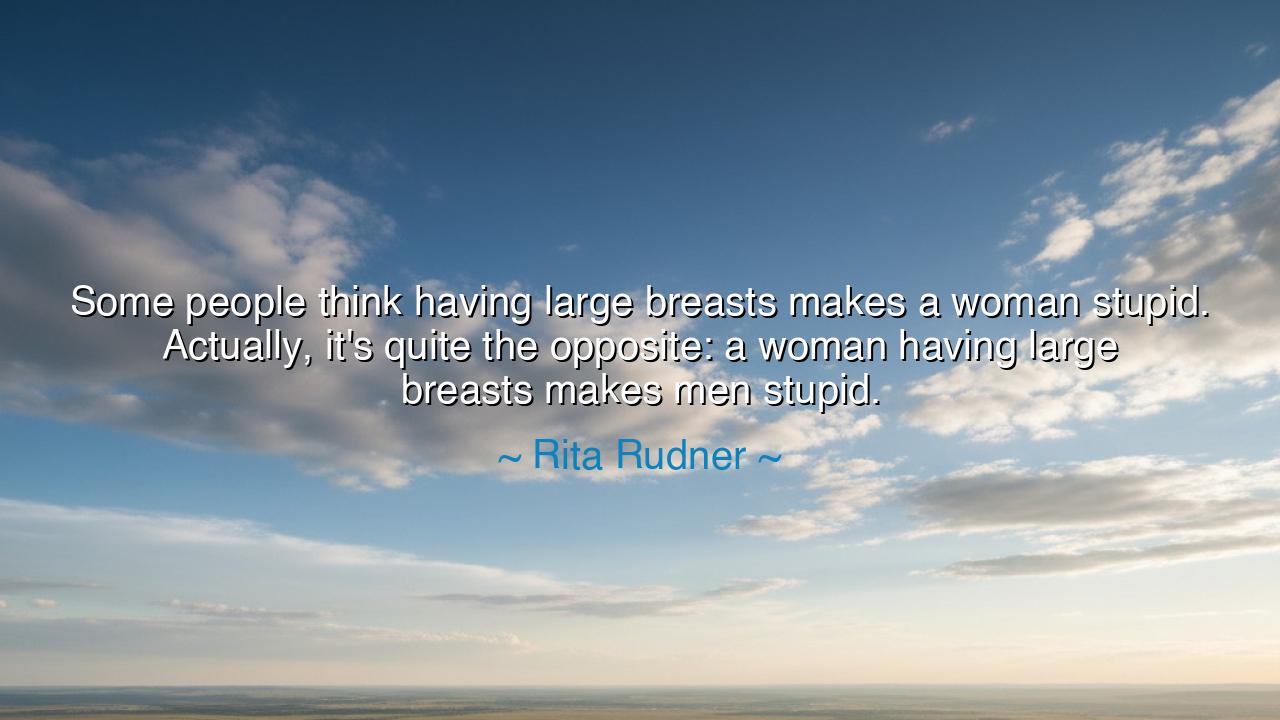
Some people think having large breasts makes a woman stupid.
Some people think having large breasts makes a woman stupid. Actually, it's quite the opposite: a woman having large breasts makes men stupid.






Hear the sharp and playful wisdom of Rita Rudner, who once declared: “Some people think having large breasts makes a woman stupid. Actually, it’s quite the opposite: a woman having large breasts makes men stupid.” Though clothed in humor, these words reveal an ancient truth: the folly of misjudgment and the blindness of desire. Rudner speaks not to demean, but to unmask the illusions that cloud the mind, showing how false perceptions entangle both women and men in webs of foolishness.
The first half of her saying reflects a long history of scorn. Society, bound by narrow thinking, often equated physical beauty—or any striking feature—with the absence of intellect. Many women with large breasts, admired or envied for their form, were too quickly dismissed as shallow, empty, or incapable of wisdom. This is not merely unkind; it is untrue, for the mind and spirit cannot be measured by the curve of the body. Rudner strikes against this ancient prejudice, reminding us that the body is not the soul, and appearance is no measure of thought.
The second half of her saying turns the insult on its head with biting wit. It is not the woman who becomes stupid, but the man, dazzled and undone by his own weakness before physical attraction. Desire can be so powerful that it clouds judgment, making men forget reason, abandon caution, or act in ways they later regret. Thus the true “foolishness” lies not in the body of the woman, but in the ungoverned mind of the man. In this way, Rudner uses laughter to teach a lesson as old as philosophy: mastery over desire is the beginning of wisdom.
History gives us many examples. Recall the story of Mark Antony, who, though a brilliant general, became entangled with Cleopatra. The allure of her presence and beauty clouded his judgment, drawing him into choices that led to the ruin of his power and the fall of his dreams. Was Cleopatra foolish for her beauty? No. It was Antony who lost command of his reason, allowing passion to steer him toward destruction. Here, Rudner’s jest shines with timeless truth: beauty does not make women weak—it often reveals the weakness in men.
This is not to condemn attraction, for it is a natural fire that drives humanity. But when the flame consumes rather than warms, when it leads to blindness rather than clarity, then folly reigns. Rudner’s words, though spoken with mirth, remind us that the wise must not be enslaved by appearances. To see clearly, one must look beyond the body and honor the mind, the character, and the heart. Otherwise, we risk repeating the errors of Antony, of countless kings, rulers, and common men undone not by women, but by their own ungoverned desires.
The lesson for us is twofold. To women: never believe the falsehood that beauty or form diminishes your intellect. Your worth is not measured in curves but in wisdom, courage, and the light you bring into the world. To men: learn to govern your mind, that beauty may inspire you but never enslave you. See the whole person, not just the outward form, and you will find relationships founded on truth, not illusion.
Practical action flows from this. Practice self-awareness in moments when attraction seeks to blind you. Ask: am I seeing clearly, or only what my desire wishes me to see? Honor the gifts of intellect and spirit in others, not just their outward appearance. And if you are judged unfairly by your form, remember Rudner’s playful shield: it is not you who are diminished, but those who fail to see beyond the surface.
Take this teaching as both a smile and a warning: appearances may dazzle, but wisdom looks deeper. Laughter is the cloak Rudner used, but the truth beneath is as sharp as any blade: the body does not make one foolish—the true folly lies in the heart that cannot master its own gaze.






AAdministratorAdministrator
Welcome, honored guests. Please leave a comment, we will respond soon